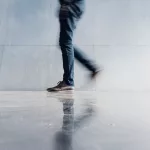Reducing Light at Night for Better Sleep
Exposure to light at night can disrupt our sleep patterns, leading to difficulty falling asleep and insomnia. Melatonin, a hormone that regulates our sleep-wake cycle, is suppressed when exposed to bright light, making it harder for us to fall asleep. To promote better sleep, reducing the amount of light in the bedroom is essential before going to sleep. This can be done by turning off electronics, closing curtains or blinds, or using a sleep mask. Additionally, it’s a good idea to avoid screens for at least an hour before bed, as the blue light emitted by smartphones and tablets can suppress melatonin production and make it harder to fall asleep. By reducing light at night, we can promote better sleep and wake up feeling refreshed and rejuvenated.





